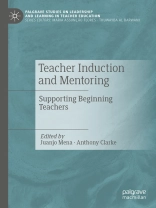This book draws together various theoretical and research-based perspectives to examine the institutionalization of mentoring processes for beginning teachers. Teacher induction, defined as the guidance provided to new teachers, is increasingly gaining traction as a key stage in promoting quality education. Major efforts have been put into reducing transitional challenges from being a student teacher to a practicing teacher; optimizing professional relationships and socialization into school dynamics; and increasing teacher retention. Mentoring has been proven to add benefits in assisting beginning teachers during the early years of their teaching career, because it provides the required knowledge and skills to face uncertain school scenarios and the complexities of practice. However, teacher induction programs are not part of regular instruction in many countries. The lack of teacher training during the induction phase might result in lower levels of commitment, professional isolation, or even attrition. This book calls for more concrete mentoring processes for early career teachers, and questions how this can be put into practice.
विषयसूची
Section I: Early career Teacher Education and induction programs.- Chapter 1. Integrative Pedagogies to Promote Professional Development in Beginning Teachers.- Chapter 2. Novice Teachers’ Induction to the Profession in Russia: Issues of management.- Chapter 3. Mentoring in the midst of teach HOUSTON: A multilayered approach.- Chapter 4. The Teacher Induction Scheme (TIS ) in Scotland – adoption, evolution, revolution..- Chapter 5. Teachers’ Resilience as Key Capacity in Professional Induction: A Systematic Literature Review.- Section II: The role of the mentor: Conceptualizing identity, concerns and challenge.- Chapter 6. Collaborative Engagement in Teacher Mentoring: Teachers and Researchers in Conversation.- Chapter 7. Early Career Teachers’ Professional Concerns and Capabilities as Triggers to Improve the Whole School Community through Collegial Mentoring.- Chapter 8. What Remains of Mentor. Investigation on the Representations of Former Trainees at the University of Bari.- Chapter 9. Virtual Mentoring in the Practicum: Teachers Learning Together in the Third Space.- Section III: Mentoring support in the induction period: skills, knowledge and experiences.- Chapter 10. Managing “Background Noises”: Forms of Support in Novices’ Induction in Arab schools.- Chapter 11. Developing an In-Situ School MEntoring Model to Build Beginning Teachers Classroom Management Capacity and Interpersonal Professional Skills.- Chapter 12. Developing an In-Situ School MEntoring Model to Build Beginning Teachers Classroom Management Capacity and Interpersonal Professional Skills.- Chapter 13. Research Team as Mentored Knowledge Community.
लेखक के बारे में
Juanjo Mena is an associate professor in the Department of Education at the University of Salamanca, Spain. He is also an affiliate professor at the University of British Columbia, Canada, and research collaborator at Kazan Federal University, Russia.
Anthony Clarke spent a number of years as a classroom teacher in Australia before working with beginning teachers, classroom teachers, and university instructors as a professor at the University of British Columbia in Canada. His current interests include practicum mentoring, teacher inquiry, and schooling in comparative perspective.












